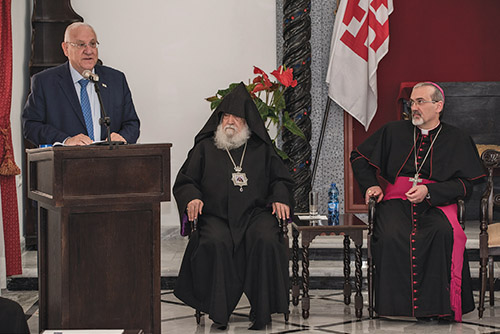


The National Security Council’s Counter Terrorism Bureau (CTB) said on Tuesday night that the Taba crossing to Egypt’s Sinai Peninsula would remain closed to Israelis due to ramped-up activity by ISIS-affiliated terrorists in the volatile region and the threat they pose to Israeli civilians.
The decision to keep the border closed also followed deadly attacks on Egyptian Coptic churches in Tanta and in Alexandria on Palm Sunday that killed nearly 40 and wounded more than 100 people. ISIS claimed responsibility for both bombings.
The CTB will reconvene in the following days to reassess its decision, which was shortly preceded by an ISIS rocket attack on southern Israel on April 10. The rocket, which was launched from the Sinai Peninsula, landed in a greenhouse in the Eshkol Regional Council and was the second cross-border attack in recent months. The border will remain open for those wishing to enter Israel.
Shortly before the rocket attack, Transportation Minister Yisrael Katz announced a rare closure of the international border crossing ahead of Passover, traditionally a time that thousands of Israelis vacation in Sinai. The border had seldom been closed since its opening in the 1980s, though it had been closed once in February 2014 and on another occasion in September 2011, also due to terror threats.
The CTB also called on Israelis in Sinai to return immediately to Israel, warning Israeli travelers and tourists of “very concrete threats” posed by ISIS terror attacks.
“The Counter Terrorism Bureau calls on all Israelis to leave the area immediately and return to Israel,” read a CTB statement. “It also asks the families of Israelis residing in Sinai to contact them and update them about this warning. In addition, the Counter Terrorism Bureau strongly recommends that all those wishing to go to Sinai refrain from doing so.”
The current attacks are the most recent surge in violence since the overthrow of former President Hosni Mubarak in 2011. Since then, terrorist factions have flourished in Sinai, staging dozens of attacks that have occasionally spilled over Israel’s southern border. These groups include the Mujahideen Shura Council, an armed Salafist group that has been linked to al-Qaeda, and other extremist factions such as Wilayat Sinai, formerly known as Ansar Bait al-Maqdis, which pledged allegiance to ISIS and became its Sinai-province offshoot.
According to IDF intelligence, Hamas has been assisting ISIS in Sinai with financial, communications, training and organizational support. ISIS also uses tunnels in order to smuggle fighters into Gaza for training and medical care.
This move also follows the recent withdrawal of Israeli Ambassador to Egypt David Govrin for “security concerns.” Israel denied any political reason behind the decision to recall the ambassador, but while some reports indicated that the move did originate in aforementioned ISIS threats, others said the move reflected rising political tensions between Netanyahu and Egyptian President Abdel Fattah el-Sisi over Gaza and its border with Egypt. Although civil ties between Israel and Egypt are largely non-existent, security cooperation between Jerusalem and Cairo is tight, largely due to mutual concerns over Hamas tunnels between Gaza and the Sinai Peninsula.
El-Sisi has been attempting to improve ties with Hamas, as indicated by Hamas leader Ismail Haniyeh’s visit to Cairo in January. Haniyeh claimed to have opened “a new page” in his relations with Egypt.
By Ilana Messika/TPS










